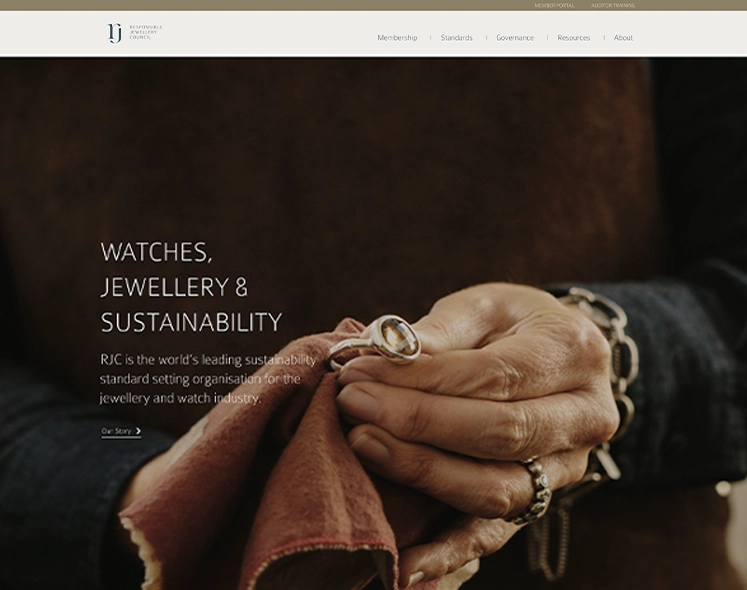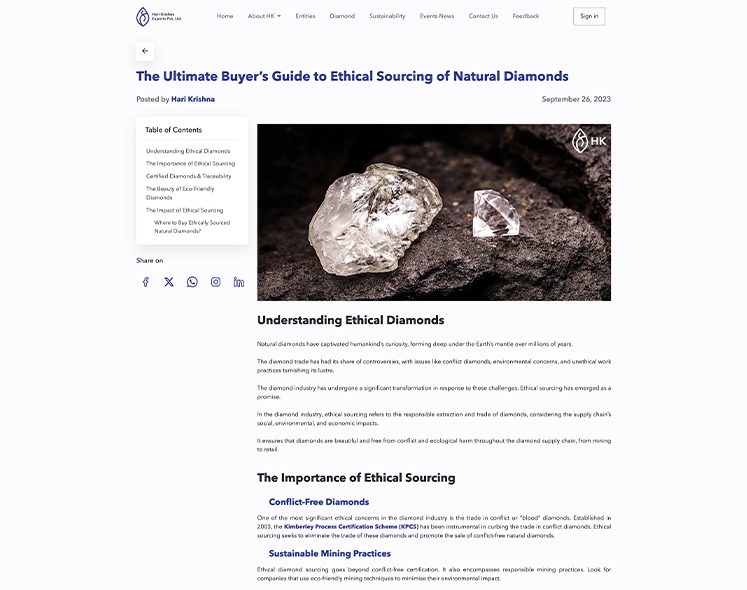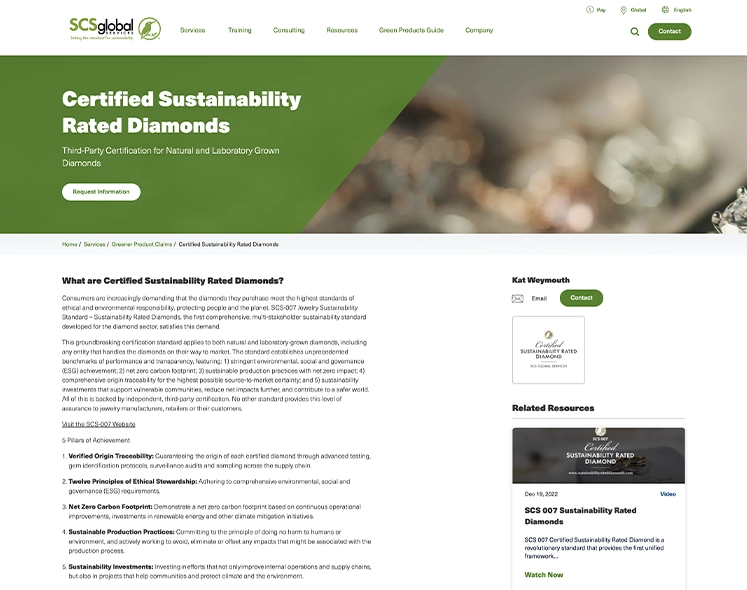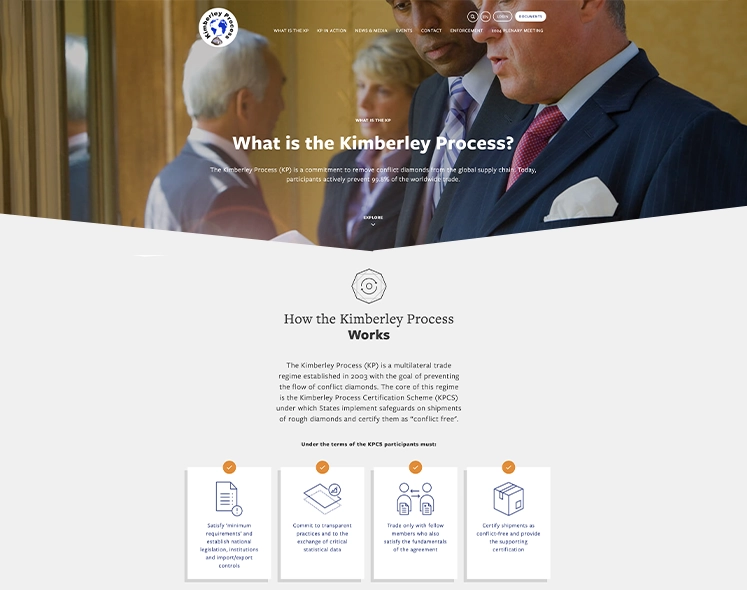Conflict Free, ethically Sourced Diamonds
Integrating Conflict free, ethically Sourced Diamonds into Your Jewelry E-Commerce Platform
A decade ago, TransPacific Software began developing diamond and jewelry e-commerce websites for retailers, who almost exclusively offered natural diamonds. Lab-grown diamonds were not widely accepted by consumers, and there were very few suppliers. Over the past five years, however, lab-grown diamonds have surged in popularity, with most retailers now offering them alongside natural diamonds, marketed as environmentally friendly alternatives.
The Rise of Ethically Sourced Natural Diamonds
Recently, a new trend has emerged: "ethically sourced natural diamonds." Consumers are increasingly aware of the ethical implications of diamond mining and are demanding gems that are mined responsibly. As the demand for ethically sourced diamonds continues to grow, it is essential for diamond and jewelry e-retailers to integrate these responsibly sourced diamonds into their offerings. This not only meets consumer expectations but also contributes to a more sustainable and ethical industry.
This guide outlines how e-retailers can identify, certify, and authenticate ethically sourced diamonds, and effectively present them on their websites.
Steps to Integrate Ethically Sourced Diamonds
1. Partner with Ethical Suppliers

To ensure your diamonds are ethically sourced, establish partnerships with suppliers who adhere to fair labor practices, environmental responsibility, and conflict-free sourcing. Look for suppliers certified by recognized authorities such as the Kimberley Process (KP) or members of the Responsible Jewellery Council (RJC).
- Conduct thorough due diligence on potential suppliers.
- Request documentation and certifications proving ethical sourcing.
- Regularly audit suppliers to maintain compliance.
2. Certification and Authentication
Ethically sourced diamonds must undergo rigorous certification to ensure their authenticity and ethical origin. Utilize reputable certification bodies to verify and grade your diamonds.
Certification Bodies:- Gemological Institute of America (GIA) : Provides comprehensive diamond grading and ethical sourcing certifications.
- International Gemological Institute (IGI) : Offers detailed grading reports and sourcing verifications.
A customer purchasing an engagement ring from your site receives a GIA certificate detailing the diamond’s ethical sourcing and grading information, ensuring transparency and trust.
3. Utilize Blockchain Technology
Blockchain technology offers a secure and transparent way to track diamonds from mine to market. Implementing blockchain can enhance consumer confidence and ensure the traceability of your ethically sourced diamonds.
Blockchain Platforms:-
Tracr by De Beers: Tracks diamonds from their origin to the retailer, providing an immutable record of each diamond's journey.
-
Everledger:Uses blockchain to create a digital ledger of diamond provenance and authenticity.
A customer can scan a QR code on your website to access the blockchain record of their purchased diamond, verifying its ethical sourcing and authenticity.
4. Highlight Certifications and Transparency on Your Website
Consumers are increasingly seeking transparency in their purchases. Clearly display certification information and sourcing details on your product pages to build trust and confidence.
Website Features:- Detailed Product Descriptions: Include information about the diamond's ethical sourcing, certification details, and the benefits of choosing ethically sourced diamonds.
- Certification Badges: Display logos of certification bodies like GIA, IGI, and RJC to reassure customers of the diamond's authenticity.
- Blockchain Verification: Provide links to blockchain records that customers can view for added transparency.
5. Educate Your Customers

Inform your customers about the importance of ethically sourced diamonds and the positive impact their purchase can have on communities and the environment. Use your website, blog, and social media channels to share this information.
Educational Content:- Blog Articles: Write articles explaining what ethically sourced diamonds are, their benefits, and how they are certified.
- Videos: Create short videos showcasing the journey of an ethically sourced diamond from mine to market.
- Infographics: Use visually appealing infographics to explain the certification process and the importance of ethical sourcing.
6. Peer-to-Peer Diamond Exchanges and Ethical Sourcing
Major diamond exchanges such as RapNet and IDEX Online have implemented programs to address the growing demand for ethically sourced diamonds and to provide origin tracing reports.
- RapNet's Green Star Source Program: Tracks the provenance of polished diamonds, ensuring they originate from rough diamond producers who meet specific ethical and environmental standards.
- IDEX Online: Allows buyers to filter their search results to display only diamonds accompanied by a GIA Diamond Origin Report (DOR), which provides detailed information about a diamond's origins, including specifics about the mining process.
- Nivoda: Set to incorporate SCS (SCS Global Services) and RJC (Responsible Jewellery Council) report details for ethically sourced diamonds in the near future.
If you are sourcing your diamonds from these exchanges, check out these features.
7. Promote Your Ethically Sourced Collections
Highlight your ethically sourced diamond collections in marketing campaigns. Use targeted advertising, email newsletters, and social media to reach potential customers who value ethical sourcing.
Marketing Strategies:- Targeted Ads: Use social media and search engine advertising to target consumers interested in sustainable and ethical products.
- Email Campaigns: Send newsletters highlighting new ethically sourced collections, certifications, and educational content.
- Social Media: Share customer testimonials, behind-the-scenes content, and educational posts about ethically sourced diamonds.
Example: Your social media channels feature customer testimonials about their ethically sourced diamond purchases, behind-the-scenes content showing your sourcing process, and targeted ads promoting your ethical collections.
8. Engage with Certification Authorities

Engage with organizations like the Responsible Jewellery Council (RJC) and SCS Global Services to stay updated on industry standards and ensure your practices align with the highest ethical and sustainability criteria.
Certification Authorities:- Responsible Jewellery Council (RJC): Certifies members who adhere to rigorous ethical, social, and environmental standards.
- SCS Global Services: Provides the Certified Sustainability Rated Diamond standard, assessing diamonds on various sustainability criteria.
Example: Your business becomes an RJC member and earns the SCS Global Services certification, showcasing your commitment to sustainability and ethical practices on your website.
Key Aspects of Ethically Sourced Diamonds
Kimberley Process
The Kimberley Process (KP) is a joint initiative involving governments, the diamond industry, and civil society to prevent conflict diamonds from entering the mainstream diamond market. Established in 2003, the KP ensures that diamond purchases do not finance violence by requiring:
- Certification: Rough diamonds must be shipped in tamper-resistant containers with certificates of origin.
- Accountability: Participant countries must meet minimum requirements and be transparent in their trade.
For more information, visit the Kimberley Process website.
RJC & SCS Certified Sustainability Diamonds
Responsible Jewellery Council (RJC): The RJC is an international not-for-profit organization that promotes responsible practices in the jewelry supply chain. RJC certification indicates that a diamond has been sourced and processed following stringent ethical, social, and environmental standards.
SCS Global Services: SCS Global Services offers the Certified Sustainability Rated Diamond standard, which assesses diamonds based on environmental, social, and ethical criteria. SCS certification ensures that the diamond meets high sustainability standards.
Use of Blockchain for Authentication
Blockchain technology is revolutionizing the diamond industry by providing a secure and transparent way to track diamonds from mine to market. Key benefits include:
- Transparency: Every transaction and transfer of the diamond is recorded on an immutable ledger.
- Security: Blockchain ensures that the diamond's history cannot be tampered with or altered.
- Consumer Confidence: Buyers can verify the ethical sourcing and authenticity of their diamonds.
De Beers' blockchain platform, Tracr, tracks diamonds from the mine to the retailer, ensuring transparency and ethical sourcing.
Conclusion
Integrating ethically sourced diamonds into your e-commerce platform not only meets the growing demand for responsible products but also enhances your brand’s reputation. By partnering with ethical suppliers, utilizing certification and blockchain technologies, and effectively communicating your commitment to ethical sourcing, you can attract discerning customers and contribute to a more sustainable jewelry industry.

